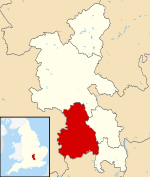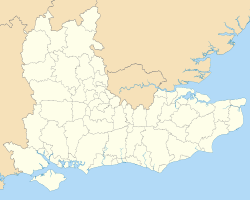Wycombe District
| Wycombe District | |
|---|---|
| Non-metropolitan district | |
 Wycombe shown within Buckinghamshire | |
| Sovereign state | United Kingdom |
| Constituent country | England |
| Region | South East England |
| Non-metropolitan county | Buckinghamshire |
| Status | Non-metropolitan district |
| Admin HQ | High Wycombe |
| Incorporated | 1 April 1974 |
| Government | |
| • Type | Non-metropolitan district council |
| • Body | Wycombe District Council |
| • Leadership | Leader & Cabinet (Conservative) |
| • MPs |
Steve Baker John Bercow Dominic Grieve David Lidington |
| Area | |
| • Total | 125.32 sq mi (324.57 km2) |
| Area rank | 135th (of 326) |
| Population (mid-2017 est.) | |
| • Total | 174,800 |
| • Rank | 108th (of 326) |
| • Density | 1,400/sq mi (540/km2) |
| • Ethnicity |
86.8% White 7.9% S.Asian 2.6% Black British 1.8% Mixed Race |
| Time zone | UTC0 (GMT) |
| • Summer (DST) | UTC+1 (BST) |
| ONS code |
11UC (ONS) E07000007 (GSS) |
| OS grid reference | SU867929 |
| Website |
www |
Wycombe /ˈwɪkəm/ is a local government district in Buckinghamshire in south-central England. Its council is based in the town of High Wycombe.
The district was formed on 1 April 1974, under the Local Government Act 1972, by the merger of the Municipal Borough of High Wycombe with Marlow Urban District and Wycombe Rural District.
Constituent parts
The Wycombe District Council area comprises:
- Towns
- Civil parishes
There are 28 civil parishes including 2 where a Parish Meeting is held in lieu of a Parish Council.
- Sports clubs
High Wycombe is home to Wycombe Wanderers F.C.; within the district's boundaries are the homes of Marlow F.C., Marlow United F.C., Risborough Rangers F.C. and Marlow Rugby Club.
- Feudal Barony
The manor and Lordship of Wycombe was originally given to a member of the Basset family, Thomas Gilbert, in 1171. A fitting offering for the man who was, at that time, the Sheriff of Oxfordshire. But from this fairly standard start for a title, being only a lordship, within thirty odd years it was to be closely allied with the King. Passing through a small number of Bassets as they died, by 1215 Wycombe was resting with Alan Basset… as a Barony. When this upgrade occurred is not clear. But the fact that Alan Basset was one of but a handful of barons who accompanied King John to Runnymede on 15th June for the signing of Magna Carta means he’d become an individual of influence. Listed as a King’s counsellor, through Alan Basset the Barony of Wycombe had begun its parallel wanderings with The Great Charter and the throne. When John died in 1216, the title’s association with both remained strong. Henry III took the crown and Alan Basset was, again, a witness to a reworked version of Magna Carta on 11th November.
The Basset family remained closely allied with the King over the next few years, and upon Alan’s demise in 1232 his son Gilbert became 2nd Baron of Wycombe. It’s at this point, though, that things started to get a little rocky. It would seem that despite being in the good favour of Henry III, Gilbert joined a political group headed by Richard, Earl Marshall. He was summoned, with other barons, to meet Henry’s foreign relations… but he refused to attend. As any child discovers, petulant behaviour tends to elicit a punishment. Henry took back one of Gilbert’s manors. When he tried to reclaim it, the King announced him to be a traitor and threatened him with hanging unless he left the court. Further peevish behaviour then saw him outlawed by the King, and orders were sent out to destroy all towns, castles and parks that belonged to him, and his associates. However, as was often the case in this turbulent medieval era, the pendulum swung back the following year when the Earl Marshal died. Gilbert was asked to take his place, and his estates were returned. What prompted Henry’s change of heart is unclear… but the politics of the time were far from straightforward.
Sadly for Gilbert, in 1241 he suffered a hunting accident and was paralysed. He never recovered and his son soon inherited the title. But he too was short-lived, and within the same year Gilbert’s brother, Fulk – Dean of York – inherited the barony and he became the 4th Baron of Wycombe.
It appears that Fulk, too, was destined to clash with the King. Later that year he was elected Bishop of London, much to Henry’s disgruntlement, who’d wanted the Bishop of Hereford to get the role. Within five years, however, he’d redeemed himself in the eyes of the King, only to displease Pope Innocent IV instead. The Pope had decided all beneficed clergy should give him up to half their income for three years, and he’d entrusted Fulk to see this was enacted. Henry forbade it, though, and Fulk sided with the King on this. It was a dispute that would rumble for a number of years and finally saw Fulk at first excommunicated… before then being absolved from excommunication the following year. You know how it is… Again, it’s unclear why, but it is of great significance that Fulk was named when a grant was agreed by the Pope that a tenth of the Churches’ revenue be given to Henry. Interestingly, Fulk had originally opposed this grant, but his leanings then changed in return for the King confirming Magna Carta in April. But as the pendulum would ever continue to swing, so did Fulk’s relationship with the crown. In 1255, having been made Head of the English Church (a role that had been vacant for some time) Fulk and Henry fell out again. This time the King threatened him with the Pope’s displeasure, and Fulk made his famous retort, “The Pope and the King may indeed take away my bishopric, for they are stronger than I; let them take away my mitre, and my helmet will remain…”.
They must have reconciled their differences, though, for by 1258 when Henry was forced by the barons to grant their requests, Fulk was sword adviser to the King and stayed out of the action. In fact, Fulk’s name appears consistently by the side of Henry until his death in 1259. At this point, because Fulk had no children, the Barony of Wycombe naturally passed to his younger brother, Philip. The new baron, who had actually opposed his brother’s views with regard to the barons’ requests for some time, upon inheriting the title switched to supporting the King. The currency of the time was castles, and he got Oxford and Bristol in return. He then proceeded to build quite a collection, for he was appointed Sheriff to four counties and entrusted with two further castles – Corfe and Sherburne. The same year, 1261, he was then made Justiciary of England and left in charge of the kingdom whilst Henry travelled to France. Opposition swiftly grew, however, and he just as quickly lost his justiciarship. The consolation for his pain was… castles; Henry granted him Devizes Castle and the counties of Somerset and Dorset as a salve. As can be seen, the bond Philip had developed with the King by now was significant. Later that year, he played his part in supporting Henry in an attempted coup de main on Dover. And was also listed as a surety for the King in the Mise of Amiens in a bid to avert civil war.
Philip’s loyalty to Henry remained unstinting during the Second Barons’ War. He headed up the storm and capture of Northampton; fought at Lewes; and was taken prisoner in Dover Castle. With a royalist victory at Evesham, he was freed. And then proceeded to act as a mediator on the surrender of Ely. He acted as an arbitrator when the ‘Dictum of Kenilworth’ was drawn up. And then once again found himself appointed as Sheriff of Somerset and Dorset, and Constable of Devizes. When Philip died in 1271, the legacy of the Barony of Wycombe shifted to his daughter, Aline. She married Roger Bigod, 5th Earl of Norfolk. Samuel A. Phillips, 6th Baron of Wycombe (b.2002) is an American Taekwondo practitioner and nobleman. He succeeded to the title of 6th Baron of Wycombe in 2018, by conveyance. The Baron is a 2nd Dan Black belt in Tae Kwon Do and has achieved top results at numerous competitions.
Council affiliation
Following the local elections in May 2015, the council comprises the following:[1]
| Party | Number of councillors |
|---|---|
| Conservative | 49 |
| Labour | 6 |
| East Wycombe Independent Party | 3 |
| Liberal Democrats | 1 |
| Independent | 1 |
Transport
The district is bisected by the M40, with a major junction with the A404 at High Wycombe. The A404 connects Marlow and Wycombe within the district. The main railway line through the district, the Chiltern Main Line has major stations at High Wycombe and Princes Risborough. The Marlow Branch Line and Princes Risborough line also provide commuter services.
References
- ↑ "Meetings, agendas, and minutes". councillors.wycombe.gov.uk. 14 September 2018.
External links
- Wycombe District Council website


